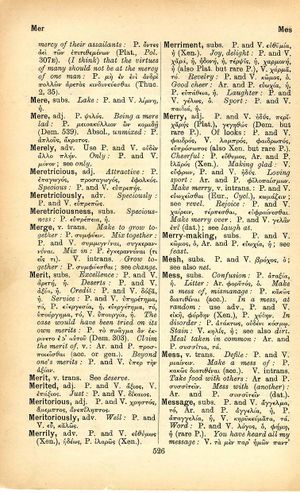mere: Difference between revisions
From LSJ
Ἴσον ἐστὶν ὀργῇ καὶ θάλασσα καὶ γυνή → Mulier et mare sunt isdem plane moribus → In ihrem Naturell sind Frau und Meerflut gleich
m (Text replacement - "link={{" to "link={{") |
m (Text replacement - "(|thumb)\n(\|link=)" to "$1$2") |
||
| Line 1: | Line 1: | ||
{{Woodhouse1 | {{Woodhouse1 | ||
|Text=[[File:woodhouse_526.jpg|thumb | |Text=[[File:woodhouse_526.jpg|thumb|link={{filepath:woodhouse_526.jpg}}]]'''subs.''' | ||
|link={{filepath:woodhouse_526.jpg}}]]'''subs.''' | |||
<b class="b2">Lake</b>: P. and V. [[λίμνη]], ἡ. | <b class="b2">Lake</b>: P. and V. [[λίμνη]], ἡ. | ||
'''adj.''' | '''adj.''' | ||
Revision as of 17:10, 18 May 2020
English > Greek (Woodhouse)
subs.
Lake: P. and V. λίμνη, ἡ. adj. P. ψιλός. Being a mere lad: P. μειρακύλλιον ὢν κομιδῇ (Dem. 539). Absol., unmixed: P. ἁπλοῦς, ἄκρατος.
Latin > English (Lewis & Short)
mĕrē: adv., v. merus.
Latin > French (Gaffiot 2016)
mĕrē (merus), purement, sans mélange : Hemin. d. Non. 133, 6 ; Gell. 12, 1 ; Pl. Truc. 43 (mss).
Latin > German (Georges)
merē, Adv. (merus), lauter, übtr., homo mere litterosus, Cass. Hemin. ann. 3. fr. 28 (bei Non. 133, 6): terminationes mere Graecae, Eutych. 457, 4 K.: et quid adversus homines stolidissimos pro eadem sententia mere digneque (vernünftiger- u. entsprechenderweise) dici possit, Gell. 17, 1 lemm.

